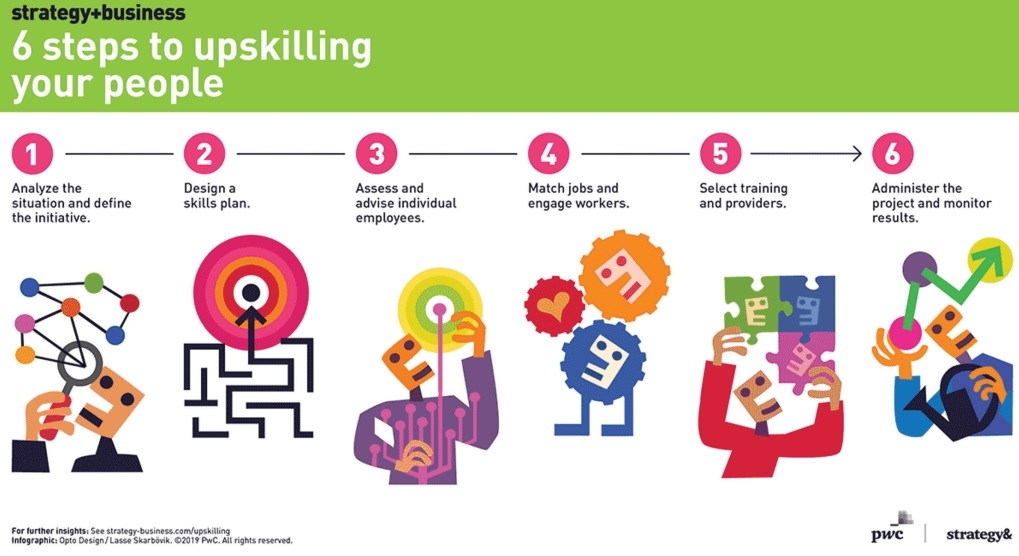Upskilling for growth – Vietnam angle
 |
| David Tay - New World New Skills leader, Markets director, PwC Vietnam |
The discrepancy between the skills people hold and those needed for jobs in the digital world will be one of the most critical problems of our time. This is where upskilling plays a vital role in our turbulent digital economy – to bridge this gap.
The concept of upskilling is about taking the skills people have today, adjusting and expanding them to make the most of technology and fulfil the talent needs of a rapidly changing business environment. More importantly, a key driver in upskilling is mindset – a way of life in today’s disrupted world to readily learn, unlearn, and relearn what we know. In Vietnam, recent research by PwC indicates that this mindset is evident among Vietnamese people.
In PwC’s Vietnam Digital Readiness report released in March, 84 per cent of respondents said they are ready to learn new skills or completely retrain. This number is higher than the 77 per cent of global respondents who were asked the same question in PwC’s Hopes and Fears 2021 survey. While the good news reflects a strong desire for learning among Vietnamese people, this only addresses one part of a much larger upskilling challenge.
The same report by PwC revealed that 45 per cent of Vietnamese respondents expressed concerns around job security due to automation. Jobs are changing fast and this is creating uncertainty and challenges for the future. According to our analysis, globally, one in three jobs is likely to be severely disrupted or to disappear in the next decade because of technological change. At the same time, there is an apparent shortage of qualified talent for the new digital economy as expressed by 72 per cent of world CEOs in PwC’s 24th Global CEO survey.
Addressing the skills challenge
The gap between the employees of the present and the workforce of the future is obvious and widening. The challenges presented to society at large are how we are going to prepare our people, and what the implications could be to a country’s citizens in terms of whether there are opportunities for them in the future.
Vietnam’s goal to become a high-income economy by 2045 is achievable. However, unless everyone is given the opportunity to build the skills they need to participate in the digital economy, Vietnam’s social and economic growth could be compromised. How the nation equips its people in building relevant skills and ensuring that no-one is left behind is crucial.
Solutions to the challenge of upskilling will need to be developed at the local, regional, and national levels, and no organisation can do this alone. This will require decision-makers – the government, educators, and business leaders – to work together in building a strong and interconnected ecosystem that is committed to a comprehensive upskilling agenda. Efforts involve putting all the following elements together – identifying the skills that will be most valuable in the future, supporting the businesses that will need them, finding the people who will use these skills on the job, and delivering the training and technology-enabled learning that could help them.
Upskilling in action
At PwC, we also asked ourselves the question of upskilling. In 2019, our ‘New World. New Skills.’ initiative was created, starting an intense journey with the ambition to ensure that everyone has the opportunity to learn, work, and participate in the digital world. Spanning over four years from 2019, PwC is committing to invest $3 billion in digital upskilling – primarily training our people, and also developing technologies to support our community and clients. We see businesses like ourselves, governments, and institutions working together to solve this issue.
 |
For business organisations, an important stage would be to map out the mix of skills and capabilities required to meet future business needs while aligning with industry growth trajectory and evolution of specific roles. We encourage businesses to look at options on how they can build, borrow, or buy these skill sets. There are six recommended steps that businesses can take in their upskilling journey: analyse the situation and define the initiative; design a skills plan; assess and advise individual employees; match jobs and engage workers; select training and providers; and finally administer project and monitor results.
The call to action for businesses is to anchor upskilling and workforce investment as a core business principle and make time-bound pledges to act.
Government leaders and policymakers have an important role to ensure that citizens have the knowledge to participate, and they themselves have the knowledge to continually drive discussion on the future of technology and regulations. Governments can also start by reshaping career perception of jobs critical to the nation. Leaders in some countries are already stepping in and leading the way. There have been some examples of governments collaborating with the financial services industry to create relevant skills platforms in Singapore, Australia, and Luxembourg. The call to action is for governments to adopt an agile approach to driving national upskilling initiatives, working with businesses, nonprofits and the education sector.
For educators, it is critical to digitally transform themselves. In the face of change, the education system needs to shift its emphasis from purely pursuing academic grades to building a student’s resilience and fostering the habit of self-directed lifelong learning.
Change is never easy. It is important for nation-building to have the right mix of skilled and adaptable people, with the right mindset and behaviours that can help drive sustainable economic growth for Vietnam. It is time to open up a genuine and fully inclusive conversation with employers, the government, and society on what systemic changes need to be initiated today to equip Vietnamese people with the skills of tomorrow.
What the stars mean:
★ Poor ★ ★ Promising ★★★ Good ★★★★ Very good ★★★★★ Exceptional
Related Contents
Latest News
More News
- Vietnamese consumers express concern about climate change (October 11, 2025 | 14:06)
- ESG seen as key to Vietnam’s business credibility and capital attraction (September 29, 2025 | 18:38)
- From compliance to strategy: ESG criteria gaining ground (September 29, 2025 | 15:47)
- Vietnamese firms step up ESG game (September 23, 2025 | 15:26)
- Vietnam tax and legal changes set to shape foreign investment landscape (September 16, 2025 | 13:46)
- Vietnamese businesses navigate US tariffs (June 25, 2025 | 12:14)
- The impact of cloud, AI, and data on financial services (April 14, 2025 | 11:20)
- Vietnam 2025 M&A outlook: trends, deals, and opportunities (March 21, 2025 | 08:54)
- Vietnam's M&A landscape mirrors global trends (February 18, 2025 | 17:13)
- Asia-Pacific CEOs enter 2025 with optimism and caution (February 06, 2025 | 17:16)

 Tag:
Tag:



















 Mobile Version
Mobile Version